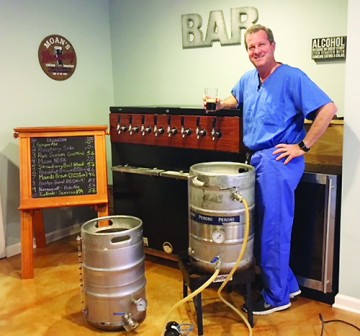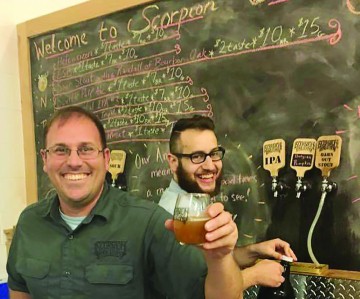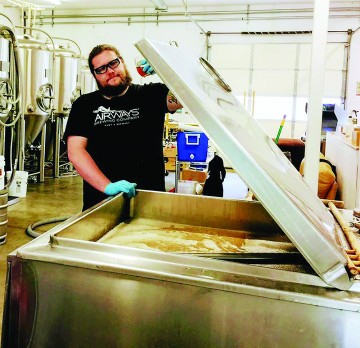Homebrew to Microbrew
For beer lovers, this is a heady time. Some 1.15 million Americans brew beer at home, in their kitchens, garages and porches, according to the American Homebrew Association. Most are guys, and most older than 30.
“Access to information and equipment has never been better,” says John Morehead, the Association’s competition director, noting that in those areas, “the lines between professional and amateur bleed into each other.”
Four or five hundred annual competitions, from local on up to the National Homebrew Convention that Morehead organizes each year, raise home brewing standards with feedback from judges, many certified by the Beer Judge Certification Program.
Microbreweries are another a sign of the times. Calvert County, which aligns with state regulations for on-site sales of craft brews, has six in various stages of growth: Calvert, Gypsy and Greenspring Brewing Companies, Mully’s Brewery and Scorpion Brewing One, Ruddy Duck Brewery and Grill. Several others are in planning.
Anne Arundel, with less hospitable regulations, has Chesapeake Brewing Company, a brewpub on West Street in Annapolis. Upcoming in Anne Arundel is microbrewery Chesepiooc Real Ale Brewery in Crofton and at least one more in Annapolis, according to the Brewers Association of Maryland. The local homebrewing supply company, Annapolis Home Brew of Severna Park, plans a microbrewery in Queen Anne’s County, just over the Bay Bridge.
Maryland has more than 60 microbreweries in 18 counties and Baltimore City, with 30 more far enough along to have names and logos.
If Comptroller Peter Franchot has his way in this year’s General Assembly, Maryland will become friendlier to breweries at every level (see sidebar).
Y ou can belly up to the bar of your favorite tavern, order and likely get served a local craft beer. Heroes in Annapolis, Lures Bar and Grill in Crownsville and Waterman’s Tavern in Edgewater are prime tapping spots. Some of the beers on those taps, like Samuel Adams and Blue Moon, are artisanal beers gone big. Others are one-time artisanals like Lagunitas, bought up at their peak of success by brewery giants. Many others rise from the greening national grassroots. Some — both newcomers and stars like Flying Dog and Heavy Seas — are made in your own back yard.
“When deciding which beers to put on tap, many factors come into play,” says Waterman’s manager Michael O’Connell. “Popularity of the brewery and the beer, rarity of the beer, customer input and the persistence of the sales person. More times than not, we will try to stay as local as possible.”
With Calvert County’s Scorpion Brewing Company’s Homebrewing Competition now registering brewers, we introduce this region’s hot brewing scene.
Homebrewed for Home’s Sake
Beer goes to your head, perhaps why some brewers may dream of quitting their day jobs to live off the fruits of their fermentation.
But most are satisfied with the personal rewards of a craft that has inspired humans for 5,000 or so years.
Among that number is Mike Brewer, 58, of Fairhaven Cliffs, who’s been brewing on his porch for a quarter century, with time off when his daughters were little.
“I like doing it for fun. It gets me where I don’t have to think about work,” says the coincidentally named Brewer, an executive construction manager who over Christmas had homebrews in all four taps of his keezer. The strongest, a Belgian dark strong ale, was brewed last May and aged six months.
Fascination with the 5,000-year-old mystery of fermentation adds another layer of appeal.
“There’s such a wide variety of flavors and styles out there now, and it’s fun to experiment, trying to make something you know and like,” Brewer says. “Sometimes I try to clone a commercial beer. Something as small as a difference in fermenting temperature can alter the flavor profile, so though I usually have an idea of a style’s taste, the specific flavor is a little surprise.”
Brewer likes the results, as well. Beer is an acquired taste, and he has acquired it. So have his daughters, who helped in the brewing and bottling when they lived at home. Nowadays, his home-brewed beer keeps them — and their friends — coming home. Daughter Mary White’s wedding was a four-tap celebration. Daughter Sarah and boyfriend Drew Sanford hand-carved dad’s four taps.
Brewer is a serious home brewer who aspires to no greater audience.
“Trying to sell is a huge commitment of both time and money,” he says, “and nowadays there’s too much competition.”
He may try a home-brewing competition some day, but so far he has been satisfied to make his own judgment his guide.
“It’s nice to have your family and friends say it’s good. Anybody who cooks or brews or makes wine enjoys that,” he says. “But I feel confident beyond their opinion.”
Homebrew, with Ambitions
Homebrewer Mike Moan of Huntingtown has aspirations.
“I kind of do dream of making a business of it,” he says. “Most of us have that dream. But it’s a lot of work to get to the scale or level where I could make it a living. So I see it in the long term, as a pre-retirement plan.”
For now, the 49-year-old surgical device salesman is heavily invested in retirement stock.

“I make a lot,” he says, and I have from 8 to 12 taps running concurrently.”
Some of those taps pour variations made from the same 10-gallon brew, which amounts to about four cases of beer. After boiling, worting, putting yeast in and fermenting, Moan divided a recent brew of stout into two separate five-gallon containers. One he flavored with roasted coconut and chocolate, calling it Mounds Stout. The other, Breakfast Stout, he flavored with coffee, vanilla and chocolate.
All this is noncommercial. His array of beers makes him “a hit in the neighborhood,” he says, and that’s a good thing since he brews in his garage and driveway.
Moan also sponsors the meetings of the local club Brew Rogues, who help him drink the beer and occasionally join him for a brew-in. A mover and shaker, he was also a founder of the Annapolis Homebrew Club.
Competition is another investment he makes in that retirement dream.
“I’m not necessarily looking to win — though who likes to lose,” he says. “Either way, you get a nonbiased critique of your beer. There are typically pairs of judges, at least one certified, and they notice things that could help you make it better the next time. A good competition gives you pretty detailed notes on flavor, carbonation level, color and how close you’ve gotten to the standards of the style you’re trying. That’s definitely helpful.”
He’s thinking he’ll see what the judges at Scorpion Brewing Company’s Competition have to say about that Mounds Stout of his.
Homebrew to Microbrewery
Some put the dream to work.
Among that ever-growing number is Scorpion Brewing’s Brian Dailey, who is now recruiting brewers for Scorpion’s fourth competition.
“I started as a home brewer,” Dailey explains. “That’s why I’m so avid. In about 1999, I got a beer kit for Christmas and made some pretty bad beer.”

His brewing improved slowly, he says, helped in part by classes at a now-defunct Alexandria brewery. Soon he was developing his own recipes, starting with a mango IPA. “That doesn’t sound odd, nowadays,” Dailey says, “but it was in 2007.”
In 2014, he took the leap.
“It looked like the right time and it was, for the craft movement bow-wave started taking off then,” says Dailey, who still hasn’t given up his day job.
Besides beer he trusted, Dailey had a couple of other things going for him: an MBA in international business; a silent partner as interested in brewing as he; and Hilary Dailey, a publicist with strong Calvert County connections as his wife. He also used Kickstarter to raise almost $15,000 in two different campaigns.
Three-plus years in, Scorpion brews about 400 barrels a year under the day-to-day direction of brewmaster Jeremiah Rasmussen. The 60-odd varieties, which rotate seasonally, are sold in Scorpion’s tasting room by the glass and 54-ounce refillable growlers that keep satisfied drinkers coming back for refills.

Distribution extends Scorpion’s reach. Scorpion kegs ride along on Anheuser-Busch distributor Bob Hall’s trucks to Calvert, Charles and Prince George’s counties — but not so far in Anne Arundel.
Local means a lot to Dailey, who named his brewery after the flagship of the Chesapeake Bay flotilla that engaged the British in the Patuxent River in the War of 1812. HMS St. Lawrence, a flagship English ale, is named for an American-built vessel captured by the English.
He buys from local farms and supports local breweries.
“We like making sure the craft keeps growing because that’s where our roots are,” he says of the competitions he started his first spring in business.
Like many home-brewing competitions across the nation, Scorpion’s is sanctioned by the Beer Judge Certification Program, which, Dailey says, “ensures quality in beer judging.” Judges must pass both written and tasting exams and earn points with continuing experience and education. They come prepared with guidelines for more than two dozen different beers, each with multiple variations and standards.
Judging is blind, in two rounds. In the first, judges compare similar beers against each other and a style sheet. In the afternoon, three judges — last year’s homebrew winner, as a grandmaster and Scorpion’s head brewer — choose the best of show from the category winners. The afternoon judging is a party open to all, with Scorpion’s brews and last year’s winner on tap.
Where Do You Take a Blue Ribbon?
Kenneth Ritchey of St. Mary’s County so pleased the judges’ palates in last year’s competition that they named his Rye Knot the Best in Show.

That was a surprise victory. His dark imperial stout, highly alcoholic at 11 percent, placed second in its category — dark, fruity and wood-aged — in morning judging. First and second in each category continued to afternoon judging, where his oak-barrel-aged, 11-percent alcohol, rye brew blew the competition away.
“As my first best of show and my biggest accomplishment so far in a home-brewing competition, it gives me more confidence because others enjoy it,” says Ritchey, who’d taken earlier prizes at Scorpion and in Salisbury. The 35-year-old home brewer, who fits his hobby around three young kids and a full-time job in an orthopedic office, is also starting up the Old Line Brewers Association in St. Mary’s County.
Plus, he’ll be brewing Rye Knot on Scorpion’s equipment for this year’s competition judging, April 7.
For now, anything more is just “a pipe dream.”
He’s not, he says, “in a place where I can drop everything. But maybe one day …”
Put Your Beer in Competition
Seventy-five beers will be accepted, with brewers able to submit one or two. Registration is open until March 31 or until all spots are taken: http://scorpionbrewing.com/homebrewcontest.html.
Reform on Tap in 2018
Comptroller Peter Franchot has thrown his weight behind a bill to reform laws governing how breweries operate. The Reform on Tap Act of 2018 has been submitted to the Speaker of the House’s office and awaits introduction.
“The act is intended to do away with regulations that have stifled one of the state’s most promising economic engines,” Franchot says.
The act supports beer production at all levels by removing limits on both production and direct-to-consumer sales.
It also repeals a peculiar Maryland “buy-back” provision. As it is, a brewery can serve an additional 1,000 barrels by first selling them to a wholesale distributor, then buying them back for sale in its own taproom.
The bill also put taproom hours under the jurisdiction of localities.
Provisions of Reform on Tap extend to breweries of all sizes. Class 5 or production breweries make millions of barrels annually. Class 7 or microbreweries can make no more than 15,000 barrels of beer a year under federal law. Class 8 is farm breweries.
Breweries selling less than 300,000 barrels annually get several special benefits under the proposed bill. First, they would be unlimited in how much beer they can distribute on their own. Second, they would be free to form private contracts with distributors, thus protecting distributors from the whims of larger breweries,
New brewers would be issued a two-year provisional license; once they exceed 50 barrels, they can apply for permanent licensing within their classification. Contract brewers — startups that hire a larger brewery to make proprietary recipes — producing more than 50 barrels annually would have no restrictions.
